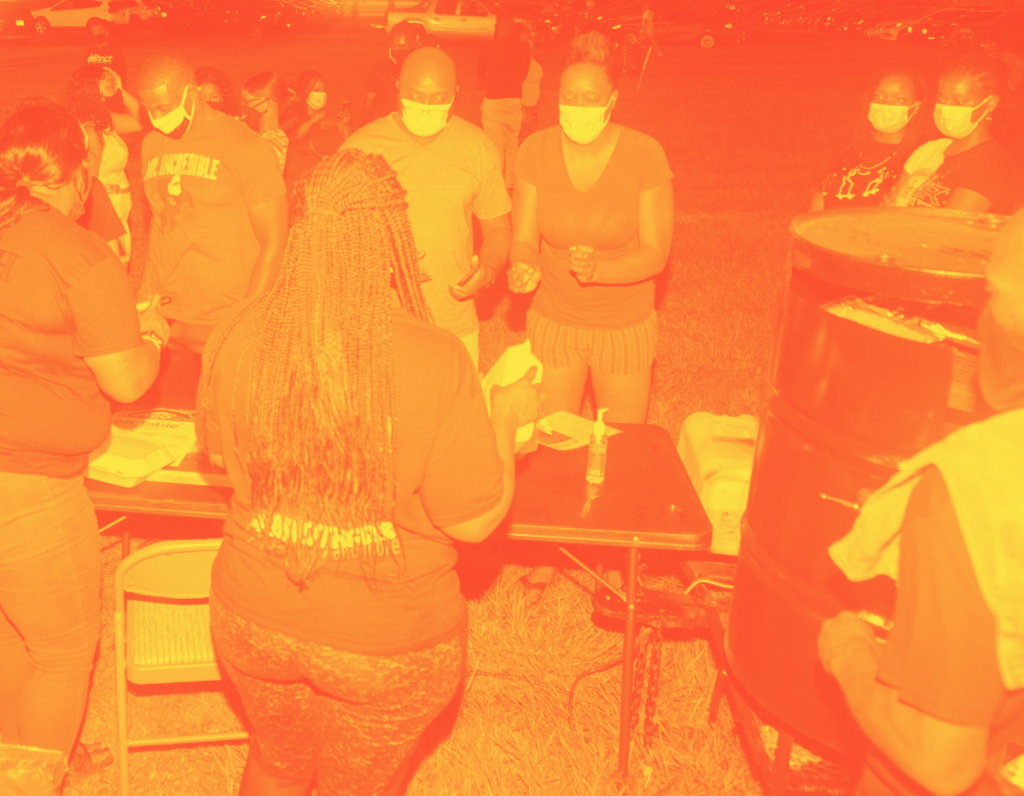To capture the range, power, and creativity of Black organizing in the 2020 elections, the Power Concedes Nothing editors decided to convene a roundtable. Karl Kumodzi moderated the conversation among Sendolo Diaminah of the Carolina Federation, Arisha Hatch of Color of Change PAC, Mondale Robinson of the Black Male Voter Project and Thenjiwe McHarris of Blackbird Action.
“It’s important for us as organizers to document the hard decisions that we often have to make in the struggle towards more Black power, more Black liberation, more Black joy,” Arisha Hatch said. “We can wrestle in the moment with things but it’s also important to sit back and reflect on what decisions were made and why. I also think this book was important for me because I think some of the most powerful, innovative, creative organizing is happening and being led by Black folks in this country, whether it’s advocacy work or electoral work, I think some of the most powerful organizing in the country and in the world and it’s important to acknowledge that.
“What I take from 2020 is that this is going to be a long fight. All the things we want, we are closer that we’ve ever been, but there’s still so much more work to do and the fight that we’re in will contain progressions and regressions constantly, but what’s most important is that we build strong, healthy communities of folks who will take care of each other when times are hard but who will also continue to push for the changes we want to see.”
Following is a taste of the rich conversation in this chapter.
From Power Concedes Nothing
Karl Kumodzi: Broadly, what impact did Black voters have in 2020, and how did they show up differently than in 2016?
Mondale Robinson: I don’t think Black people show up differently in elections at all. Since Black people have been able to vote in this country, we’ve seen them vote like nobody else votes: together. So much so that people begin to have conversations about the 10% to 12% of Black people that don’t vote like the rest of us. We saw increases in millennial voters and the generation behind them at higher levels than ever in 2018, a midterm election. So it wasn’t just 2020.
What was wonderful for 2020, for me, was that every white person—meaning their political organizations, the parties, the pollsters, the news channels—all their political slips were showing. Especially as it pertains to Black men. They didn’t know shit about shit. They literally said 20% of Black men were going to vote for Trump, Black men were not excited about the election, and that means that we were going to stay at home. And what we saw were the lies on display. There are no apolitical brothers in this country at all. There are brothers who don’t care about the way we play politics, but that’s different from apolitical. Every Black man I met and had a conversation with has a political position. Some of that does not translate to: I need to go vote for these whack-ass candidates. But they have positions.
And also there’s no apathy in Black men. There’s a level of antipathy that is grounded in 150 years of being the targets of voter suppression. We also saw that if we engage them not with the Barack Obama brothers with a suit and tie telling us to pull our pants up or stop getting tattoos on our faces, but if we engage them around issues that were important to them and show them how elections directly affect that, then you can move voting from that space of self-actualization, and brothers will see it as a tool to help them address some of the problems that they’re plagued with on a day-to-day.
So I was super excited to watch Black men in Georgia, brothers who were old enough to vote for Barack Obama in 2008 and 2012 but did not turn out, come out in 2020, and that’s directly linked to the work that we were doing. They care about what’s going on and they vote if you give them a reason to vote. And it can’t be transactional because they see through that shit. So that idea of: this is the most important election or this candidate is going to change your life, does not work with Black men. Usually when you say it to brothers, you hear them say, “This shit don’t make sense to me. My life ain’t changed under any president.” And it’s true to some extent….
Thenjiwe McHarris: Black people did in 2020 what we have done historically—we organized in order to protect our people. Black lives have always been under attack and this in no way began with the election of Donald Trump. Many of our people understood that Trumpism marked an escalation, however, and the threat was not just about the election of Trump, but a far right-wing agenda led by radical right organizations with an eye toward specific policy priorities and conservative appointments. Trump- ism serves their strategy as it fuels not only a growing appetite and demand for a “Trump” but also the popularization of a set of ideas and the building of a political base. Despite our victory, their agenda continues to advance in some ways and the threat continues, but many Black people understood that a second term was something that our people could not afford.
We have a history of organizing around elections as both a harm mitigation tactic and a strategy to impact local, state, and federal agendas. It has been used for the offensive and the defensive, like Sendolo mentioned, so it is not new, but we did see leaders who have a history of not engaging in electoral organizing understand that it was politically necessary. In the midst of a global pandemic, a recession, uprisings, repression, the targeting of our movement, massive voter suppression, intimidation, misinformation—Black people delivered the White House and the Senate. Turnout was historic for both the Republican and the Democratic Party with almost 70% of those eligible to vote turning out.
The full spectrum of the right and the left understood 2020 to be an important battlefield. What this meant for Black voters in particular is in key states and in key cities from Atlanta to Philadelphia, and across the country, Black people had to use a variety of tactics to engage the Black electorate, while not ignoring the ways the Democratic Party has historically failed and betrayed our community. Much of what happened in 2020 was not only an uptick in organizing, but the result of years and decades of organizing—much of it taking place in the South. So really a combination of factors led to the wave of Black political activity that took place in 2020.
Sendolo Diaminah: I experienced the change less as what are all the Black voters doing, and more of what are all the different ways that Black people are grappling with things? And what are some of the new things that are on the horizon? I got to see our highly active volunteers and leaders really trying to figure out how we move from direct action and mobilization to electoral work to culture and communications, like the combination of those things. I remember listening to the presidential debates and listening to the way that reparations was being talked about, and in my lifetime, I had never seen anything like that. And I heard and talked to other Black folks about that. And the sense was, we are forcing a completely different conversation about what’s happening in this country and what should be happening. And the development of a sense of political leadership by Black people, of the progressive bloc as a whole, is something that our people have been wrestling with. I really saw that. Some of our folks are like, “Yeah, people are supportive of Black lives right now, but they’re not going to be supportive of us over the long term.” Then somebody else will chime in from down the street, be like, “Nah, that’s not true, this is different.” So to me, I think it’s really the range of political possibilities that our folks are wrestling with that feels different.
Did you enjoy this article?
We're in the middle of our annual fund drive, and this year we're building our own internal infrastructure for subscriptions, meaning more of every dollar pledged goes to fulfilling our mission. Subscribe today to support our work and be a part of Convergence's next evolution.

